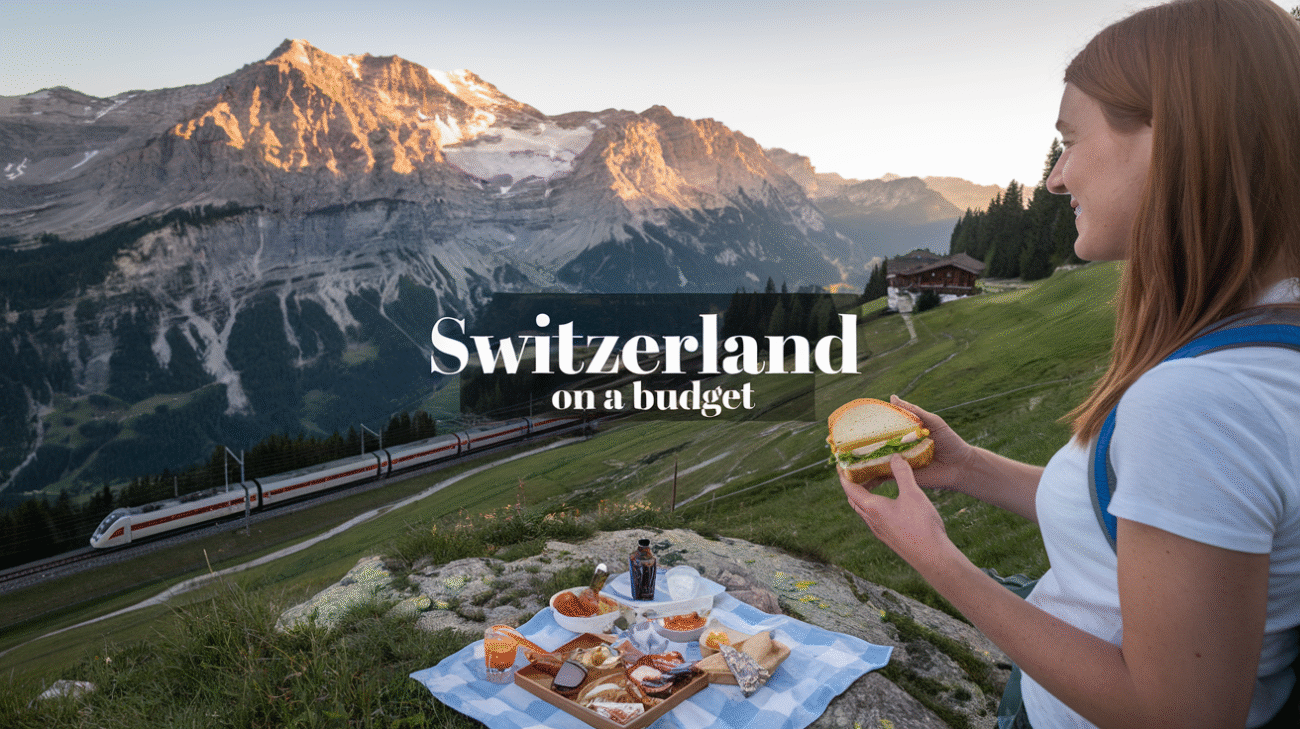Dreaming of pristine alpine lakes, snow-capped mountains, and charming medieval towns, but worried that Switzerland’s notorious price tags will shatter your travel dreams? You’re not alone. With hotel rooms easily exceeding 200 CHF per night and simple restaurant meals costing upwards of 25 CHF, Switzerland has earned its reputation as a budget-traveler’s nightmare. But here’s the secret: experiencing the breathtaking beauty of the Swiss Alps doesn’t have to drain your savings account ✨
What if you could glide through Switzerland’s efficient transportation network at half the regular cost? Or wake up to stunning mountain views without paying premium prices? Imagine savoring authentic Swiss cuisine for a fraction of restaurant prices while discovering hidden gems that many tourists miss. The good news is that with some insider knowledge and strategic planning, you can enjoy everything this alpine paradise has to offer without returning home to a mountain of debt 💰. From scoring Supersaver tickets on the iconic Swiss trains to finding budget-friendly accommodations in stunning locations, this guide will reveal how to make your Swiss adventure both memorable and affordable.
In the following sections, we’ll dive deep into mastering Switzerland’s costs, navigating its world-class transportation system on a budget, finding affordable places to stay, eating well without overspending, and enjoying Switzerland’s magnificent attractions without breaking the bank. Let’s transform that seemingly impossible Swiss dream into an affordable reality!
Understanding Switzerland’s Travel Costs
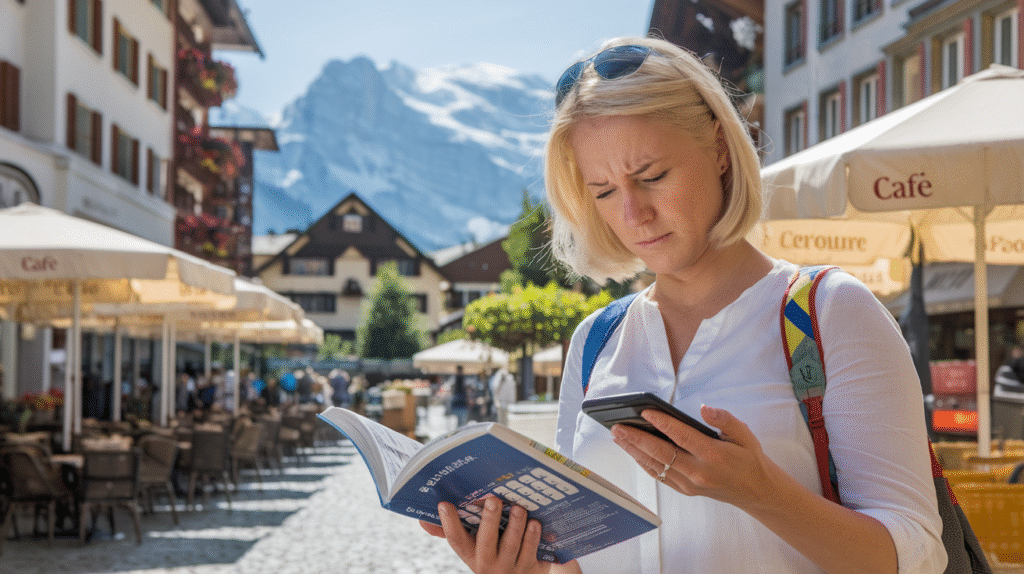
Switzerland’s reputation as an expensive destination is well-deserved, but with proper planning, you can experience this alpine paradise without depleting your savings. Let’s break down the costs you can expect and how to plan effectively for your Swiss adventure.
ALSO READ: How to Travel Japan on a Shoestring Budget: 7 Money-Saving Tips
Average Daily Budget Breakdowns for Backpackers, Mid-range, and Luxury Travelers
Backpacker Budget: ~95-146 CHF (Sfr123) per day
- Accommodation: 30-40 CHF for hostel dorms
- Food: Budget meals from grocery stores and occasional kebabs (10 CHF)
- Transportation: Public transit options
- Activities: Primarily free outdoor experiences and city walking
- Key savings: Couchsurfing, housesitting, or volunteering via WorldPackers for free accommodation
Mid-range Budget: ~200-354 CHF (Sfr296) per day
- Accommodation: 70-120 CHF for private hostel rooms or budget hotels
- Food: Mix of self-catering and restaurants (25-60 CHF per meal)
- Transportation: Public transit with occasional taxi use
- Activities: Paid attractions and some guided tours
- Daily breakdown: Approximately 114 CHF for food, 42 CHF for transportation, and 100-140 CHF for accommodation
Luxury Budget: ~400-830 CHF (Sfr695) per day
- Accommodation: 371 CHF (Sfr305) average for quality hotels, up to 900 CHF for luxury options
- Food: Fine dining experiences (60+ CHF per meal)
- Transportation: Private transfers, first-class train travel
- Activities: Premium guided tours and exclusive experiences
- Additional expenses: Nightlife (~29 CHF daily) and shopping
NOTE: 1CHF = 1.23 $
Best Seasons for Budget Travel (April-June and September-November)
The timing of your visit significantly impacts your expenses in Switzerland. The shoulder seasons spring (April to June) and autumn (September to November) offer the best value:
- Lower accommodation costs: Hotels and hostels reduce their rates during these periods
- Fewer tourists: Less competition for budget accommodations
- Pleasant weather: Still suitable for outdoor activities without the premium prices of peak season
- Local events: Many festivals and cultural experiences happen during these months
- Discounted attractions: Some tourist spots offer reduced admission
Avoiding peak summer (July-August) and winter ski seasons (December-March) can reduce your overall expenditure by 20-30%, particularly in popular tourist destinations like Zermatt, Interlaken, and Lucerne.
Planning Your Budget for Transportation, Accommodation, Food, and Activities
Transportation Budget Planning
- Daily average: 42 CHF (Sfr35)
- Consider the Swiss Half Fare card (120 CHF) if staying for more than a few days
- City guest cards often provide free local transportation
- For extensive travel, evaluate whether the Swiss Travel Pass or Saver Day Pass offers better value
- Train travel is generally more economical than flying or renting cars in urban areas
Accommodation Budget Planning
- Hostels: 30-40 CHF for dorms, 70-120 CHF for private rooms
- Budget hotels: 70-120 CHF per night
- Mid-range hotels: Average 371 CHF (Sfr305) for two people
- Long-stay discounts: Consider basing yourself in one location and taking day trips
- Location strategy: Staying on city outskirts can reduce costs while maintaining public transport access
Food Budget Planning
- Daily average: 114 CHF (Sfr94), but can range from 46-255 CHF
- Budget meals: Grocery shopping (100-125 CHF weekly)
- Casual dining: Kebabs (10 CHF), lunch specials (9-15 CHF)
- Traditional experiences: Plan for at least one authentic Swiss meal like cheese fondue (30-35 CHF)
- The Too Good To Go app can help find discounted food options
Activities Budget Planning
- Average daily sightseeing cost: 62 CHF (Sfr51)
- Free experiences: Hiking trails, public beaches, and self-guided city tours
- Paid attractions: Museums often have free days or reduced evening admission
- City passes: Zurich Card and Geneva City Pass offer substantial savings
- Special experiences: Budget for one or two premium activities like the Lindt Chocolate Museum or Mount Titlis excursion
Now that we’ve established a clear understanding of Switzerland’s travel costs, the next section on “Mastering Swiss Transportation on a Budget” will explore how to navigate this well-connected country efficiently while maximizing your savings on trains, buses, and other transport options.
Mastering Swiss Transportation on a Budget
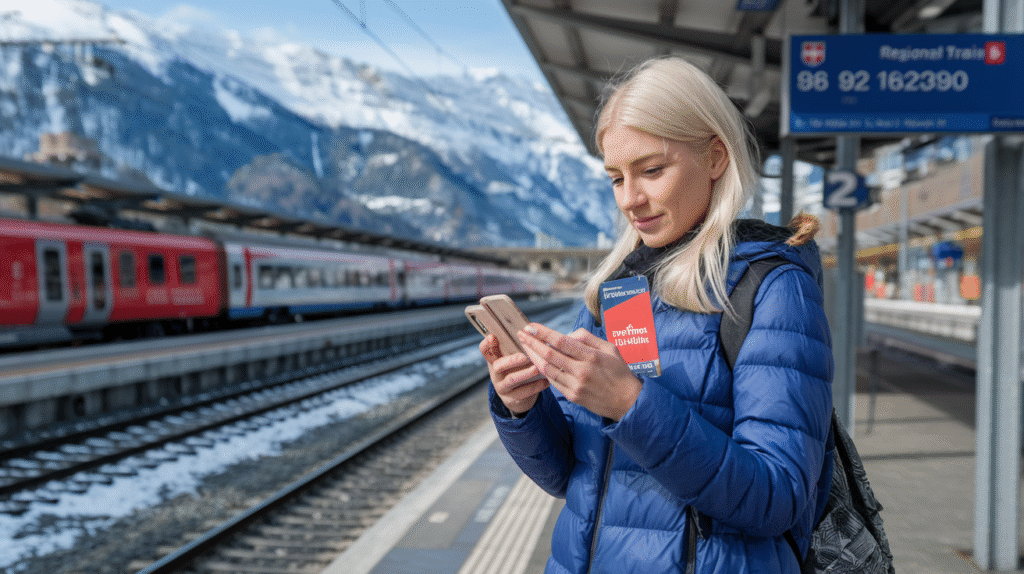
Now that we’ve explored Switzerland’s notorious travel costs, let’s dive into how you can navigate this beautiful country without emptying your wallet. Switzerland’s public transportation system is renowned for its efficiency and punctuality, but it also comes with a reputation for being expensive. With some insider knowledge, you can significantly reduce these costs while still enjoying the comprehensive network of trains, buses, trams, boats, and cable cars.
Saving with Supersaver tickets and Saver Day Passes
One of the most effective ways to cut transportation costs is by planning ahead. Supersaver tickets offer discounts of up to 40% on train journeys when booked in advance. While these tickets limit your flexibility (they’re typically bound to specific trains and times), the savings can be substantial for budget travelers.
Saver Day Passes are another excellent option, providing unlimited travel throughout the Swiss transportation network on a specified day. These passes are perfect for days when you plan to cover significant distances or visit multiple locations. By purchasing these passes in advance, you can secure better rates and plan your itinerary more effectively.
Utilizing regional guest cards for free local transport
A little-known secret among budget travelers is that many Swiss hotels and accommodations offer regional guest cards that include free public transportation within specific areas. These partnerships can provide tremendous value, essentially eliminating local transportation costs during your stay. When booking accommodations, especially in tourist regions, always inquire about whether they offer guest cards with transportation benefits.
Junior Travel Cards and family discounts
Families traveling to Switzerland have several money-saving options. The Junior Card is a fantastic deal that allows children aged 6-16 to travel for free when accompanied by a paying parent. Alternatively, the Children’s Co-Travel Card offers the same benefit but extends it to any adult named on the card, not just parents.
These family-focused discounts can transform an otherwise expensive family vacation into a more affordable adventure, making Switzerland’s pristine landscapes and cultural attractions accessible to travelers with children.
Comparing public transport passes versus car rental costs
For many travelers, deciding between public transportation and car rental comes down to cost and convenience. While Switzerland’s public transportation system is comprehensive, it can be expensive for infrequent travelers. The Half-Fare Card (CHF190 annually for residents, CHF120 for non-residents for a month) provides a 50% discount on most transportation options and might be worth considering for longer stays.
For international visitors, the Swiss Travel Pass offers unlimited travel across most public transportation modes for durations between 3 and 15 days. It also includes free entry to approximately 500 museums, adding significant value beyond transportation.
When comparing with car rentals, consider not just the rental fee but also fuel costs, parking fees (which can be substantial in Swiss cities), and the convenience factor. In many cases, especially for solo travelers or couples, public transportation passes prove more economical than renting a car.
Affordable ways to get to Switzerland from abroad
Before enjoying Switzerland’s internal transportation, you need to get there first. Look for international offers that combine travel to and within Switzerland. The International Swiss Half Fare Card offers discounts similar to the domestic version for a month, making it valuable for international visitors.
For those arriving by air, major Swiss airports connect seamlessly with the rail network. Look for airline packages that include rail transfers, as these can offer better value than purchasing separately.
When planning your arrival, consider that tickets must be purchased before boarding trains, as buying onboard incurs significant surcharges. Various online platforms like Trainline and Swiss Railways’ website provide detailed information and advance booking options.
ALSO READ: How Much Does a Trip to Hawaii Really Cost?
With these transportation savings secured, you’ll have more budget available for finding comfortable yet affordable places to stay. In our next section, we’ll explore strategies for finding budget-friendly accommodations throughout Switzerland without compromising on comfort or location.
Finding Budget-Friendly Accommodations
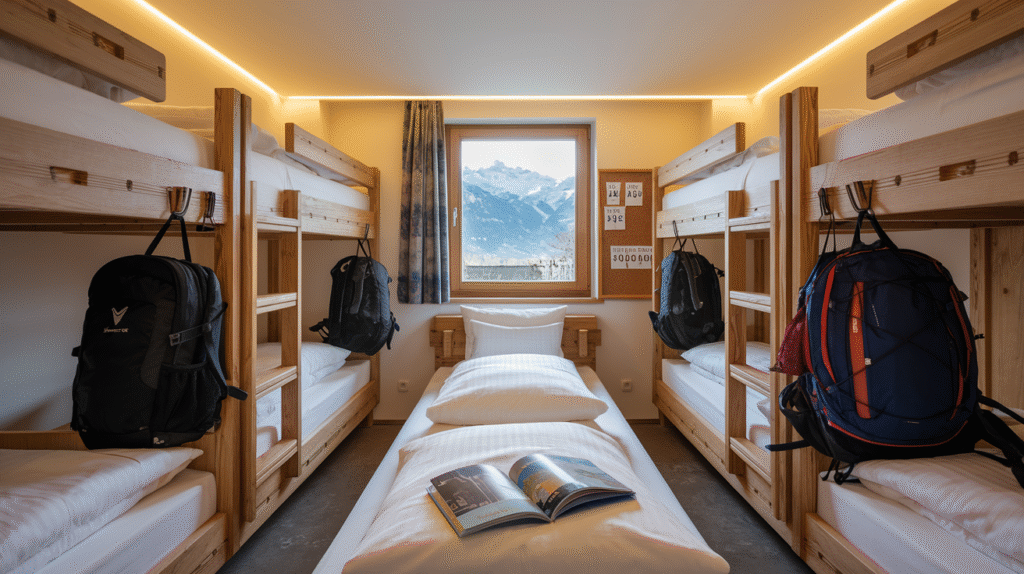
Now that we’ve covered how to navigate Switzerland’s transportation system without draining your wallet, let’s look at another significant expense: accommodations. Switzerland may have a reputation for luxury hotels, but there are plenty of budget-friendly options that won’t compromise your travel experience.
Youth Hostels and B&Bs Under 40-70 CHF
Swiss Youth Hostels offer some of the most affordable accommodations throughout the country, with an emphasis on sustainability. The Backpackers Villa Sonnenhof is a standout option for budget travelers, providing shared accommodations with rates often under 70 CHF. These hostels typically include common areas where you can meet fellow travelers and many offer recreational activities.
For a more personal experience, family-run B&Bs like Hotel Roessli in Interlaken offer rooms starting from just 106 CHF, with easy access to outdoor activities. The Jungfrau Lodge Swiss Mountain Hotel in Grindelwald, another family-managed establishment, provides rooms from as low as 76.50 CHF a rare find in Switzerland’s tourism landscape.
Budget Hotels and Apartment Rentals for Longer Stays
For those staying longer, apartment rentals often provide better value. Hotel Adler Zürich, located in the historic old town, offers modern, refurbished rooms with rates starting around 150 CHF per night. Similarly, Hotel De la Paix in Lucerne provides central accommodation from approximately 130 CHF, making it an excellent base for exploring the city.
The Hotel Central in Lausanne averages around 150 CHF nightly and offers a convenient location near major attractions. For budget-conscious travelers in Geneva, Hotel Montbrillant provides relatively affordable luxury at about 200 CHF, which is reasonable for this notoriously expensive city.
Remember that Switzerland’s median hotel price is approximately 136 CHF, with St. Gallen being identified as the most affordable city for visitors.
Camping Options and Mountain Huts for Adventure Seekers
Adventure enthusiasts can significantly reduce accommodation costs by choosing camping sites. Camping Jungfrau caters to outdoor lovers with modern facilities and breathtaking views of the surrounding Alps. These sites typically provide amenities like showers, cooking facilities, and sometimes even Wi-Fi.
TCS campings are another excellent option for those seeking active recreation in nature without the high costs of traditional accommodations. For hikers, mountain huts offer unique stays in spectacular locations, though availability may be seasonal.
HotelCard Subscriptions and Direct Booking Advantages
Consider investing in a HotelCard subscription, which works like a half-price card for hotels throughout Switzerland. This can lead to substantial savings, especially for longer trips. Additionally, booking directly with hotels often provides better rates than using third-party platforms, with some establishments offering special deals for direct bookings.
When comparing prices, don’t forget to check if breakfast is included, as this can save you 15-25 CHF per day on morning meals.
Reka Villages for Family Travelers
Families traveling to Switzerland should consider Reka holiday apartments, which offer family-friendly accommodations at reasonable prices. These properties are specifically designed for family needs and typically include kitchen facilities to help reduce food costs.
Hotels like Nidwaldnerhof near Lake Lucerne and Hotel The Larix with ski-in/ski-out access provide family-oriented amenities while maintaining reasonable price points compared to luxury alternatives.
With your accommodation sorted at these budget-friendly options, you’ll have more resources to enjoy Swiss cuisine. In the next section, we’ll explore how to enjoy Switzerland’s culinary delights without breaking the bank, from affordable restaurant options to self-catering strategies that can dramatically reduce your food expenses.
Eating Well Without Breaking the Bank
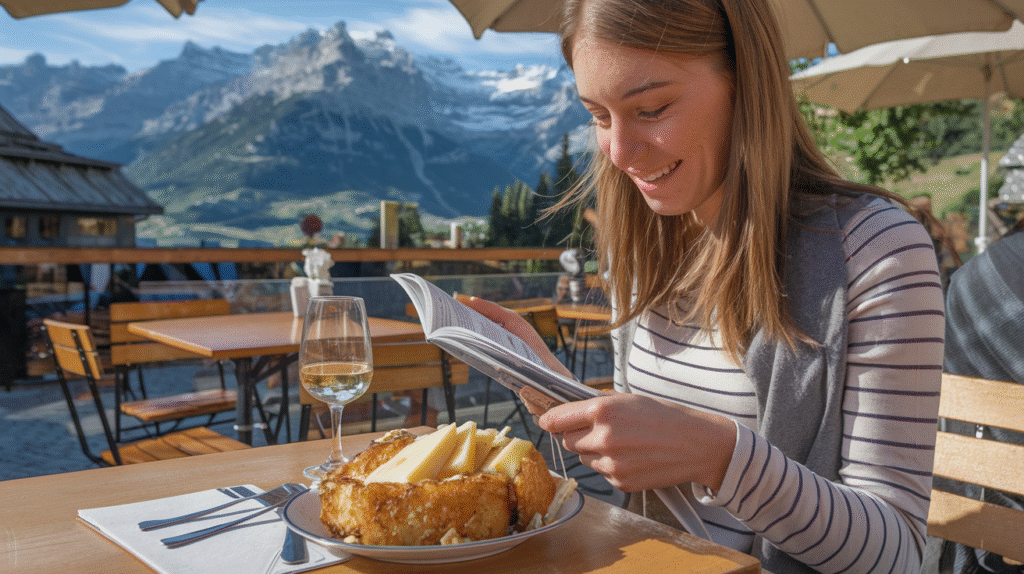
Now that we’ve covered finding budget-friendly accommodations in Switzerland, let’s tackle another significant expense: food. With simple restaurant meals often costing CHF 25 or more, eating out in Switzerland can quickly deplete your travel budget. However, with some insider knowledge and planning, you can enjoy delicious Swiss cuisine without breaking the bank.
Shopping at Budget Supermarkets like Aldi and Coop
One of the most effective ways to save money on food in Switzerland is to shop at local supermarkets. While Migros and Coop are the main grocery chains, budget options like Aldi and Lidl offer significantly lower prices. These discount supermarkets provide excellent alternatives for essentials like bread, cheese, fruits, and other picnic supplies.
To maximize your savings:
- Visit supermarkets in the evening, particularly shortly before closing time, when they often discount perishable items like bread and prepared foods
- Stock up on breakfast items rather than paying for expensive hotel breakfasts
- Embrace the Swiss tradition of “Abendbrot” (evening bread) – a simple meal of bread, cheese, and perhaps tomatoes enjoyed by locals and savvy travelers alike
Remember that grocery stores in small villages may have limited hours, so plan your shopping accordingly, especially on Sundays when most stores are closed.
Using “Too Good To Go” App for Discounted Meals
Switzerland has embraced the fight against food waste with innovative solutions that benefit budget travelers. The “Too Good To Go” app allows you to purchase surplus food from restaurants and bakeries at significantly reduced prices. This not only helps reduce food waste but also gives you access to quality meals at a fraction of the regular cost.
Another similar option is Ässbar, which specializes in selling leftover baked goods at lower prices. These platforms provide an excellent opportunity to sample local delicacies without the premium price tag.
Perfect Picnic Spots and Meal Planning Strategies
Picnicking is a practical and enjoyable alternative to dining out in Switzerland. Many hiking trails feature official picnic areas equipped with tables and fire pits, offering spectacular views without the high costs of mountain restaurants.
For successful picnic planning:
- Budget approximately CHF 10-15 per meal when self-catering
- Visit local bakeries for high-quality sandwiches, salads, and authentic Swiss desserts
- Purchase bread, local cheese, and fresh produce from supermarkets
- Look for picturesque spots by lakes and in parks to enjoy your meal
This approach not only saves money but also provides an authentic Swiss experience, as even locals appreciate the frugality and pleasure of dining outdoors in their beautiful country.
Drinking Free Tap Water from Public Fountains
With bottled water and sodas often costing CHF 5 or more in restaurants, staying hydrated in Switzerland can be surprisingly expensive. Fortunately, Switzerland boasts some of the cleanest tap water in the world, available free from thousands of public fountains throughout the country.
Bring a reusable water bottle and refill it at these fountains – they’re found in virtually every town square and along many hiking trails. Unless specifically marked as non-potable, the water is safe and delicious to drink, directly from the Alps in many cases.
Affordable Restaurant Options and Lunch Specials
When you do want to experience Swiss restaurants, these strategies will help manage costs:
- Opt for lunch rather than dinner, as many restaurants offer fixed-price lunch specials (typically CHF 20-30) that include local specialties
- Consider vegetarian options, which are generally more affordable than meat dishes
- Look for kids’ menus priced between CHF 9-15 if traveling with children
- Try Asian and Indian restaurants, which often provide authentic and reasonably priced meals
- Sample kebab shops, where you can typically get a filling meal for under CHF 10
- Visit self-service cafes in supermarkets for budget-friendly meals, but be cautious with salad buffets which can become expensive
- Remember that service charges are included in Swiss restaurant bills, so locals typically just round up rather than leaving large tips
With your dining budget optimized, you’ll have more funds available for the next exciting part of your Swiss adventure. In the next section, we’ll explore how to enjoy Switzerland’s magnificent attractions for less, ensuring you experience the best this beautiful country has to offer without overspending.
Enjoying Switzerland’s Attractions for Less

Now that we’ve covered how to save money on food while traveling in Switzerland, let’s explore how to experience the country’s incredible attractions without emptying your wallet. Switzerland may have a reputation for being expensive, but with some insider knowledge, you can enjoy its stunning landscapes and rich cultural heritage on a budget.
Extensive Network of Free Hiking Trails
Switzerland’s most spectacular attraction costs absolutely nothing to enjoy – its natural beauty. The country boasts an extensive network of well-maintained hiking trails that wind through breathtaking Alpine scenery, picturesque villages, and stunning lakeshores. These trails are completely free to access and offer some of the best views in the country.
Whether you’re exploring scenic cities like Lucerne and Zurich or venturing into the countryside, hiking allows you to experience Switzerland’s postcard-perfect landscapes without spending a franc. Many trails are accessible via public transportation, making them easy to reach if you’ve invested in a rail pass. For the best value, plan several hikes throughout your trip to maximize your enjoyment of Switzerland’s natural splendor.
Free Museum Days and City Walking Tours
Switzerland is home to over 1,100 museums, and remarkably, about one-third of them are completely free to enter. For those that do charge admission, many offer designated free days each month or discounted evening hours.
Free walking tours are available in most major Swiss cities, providing an excellent introduction to local history and culture. These tours operate on a tip-based system, allowing you to pay what you feel the experience was worth. Cities like Geneva, Zurich, and Lucerne offer guided walks through their historic centers, revealing hidden corners and fascinating stories you might otherwise miss.
Additionally, entry to Switzerland’s beautiful churches and cathedrals is typically free, offering glimpses of stunning architecture and art without an admission fee.
Making the Most of Regional Guest Cards for Discounted Attractions
One of Switzerland’s best-kept budget secrets is the regional guest card system. Many towns provide these cards complimentary to visitors staying in local accommodations. These valuable cards offer free public transportation within the region and significant discounts on local attractions.
The Swiss Travel Pass, while an initial investment, grants free entry to numerous museums across the country. For travelers planning to visit multiple cultural sites, this pass can quickly pay for itself while also covering transportation costs.
Check with your accommodation provider upon arrival to see what guest cards are available in your area – they can substantially reduce the cost of experiencing local attractions.
Hidden Gems and Less Touristy Destinations
While Switzerland’s famous destinations like the Matterhorn and Lake Geneva are certainly worth visiting, exploring less touristy locations can provide equally memorable experiences at a fraction of the cost.
Consider visiting the Rhine Falls, Switzerland’s largest waterfall, which offers free access to spectacular views. The Swiss National Park provides incredible hiking opportunities without an entry fee. In Bern, you can observe bears at the dedicated park without paying admission.
Botanical gardens in various cities offer peaceful retreats and beautiful displays without charging visitors. These hidden gems not only save you money but also help you avoid crowds at more popular attractions.
Budget-Friendly Souvenir Shopping at Local Markets
Rather than purchasing expensive souvenirs from tourist shops, explore local markets for authentic and affordable mementos of your Swiss adventure. These markets offer locally-made crafts, foods, and goods at prices significantly lower than those in souvenir shops.
You’ll find unique items that truly represent Swiss culture while supporting local artisans and farmers. Many towns host weekly markets where you can browse handcrafted items, sample local specialties, and interact with residents creating memories that are far more valuable than mass-produced trinkets.
By following these tips, you can experience the best of what Switzerland is known for breathtaking natural beauty, rich cultural heritage, and charming towns all while keeping your budget intact. The country’s most memorable experiences often come from its free or low-cost attractions rather than its expensive tourist traps.
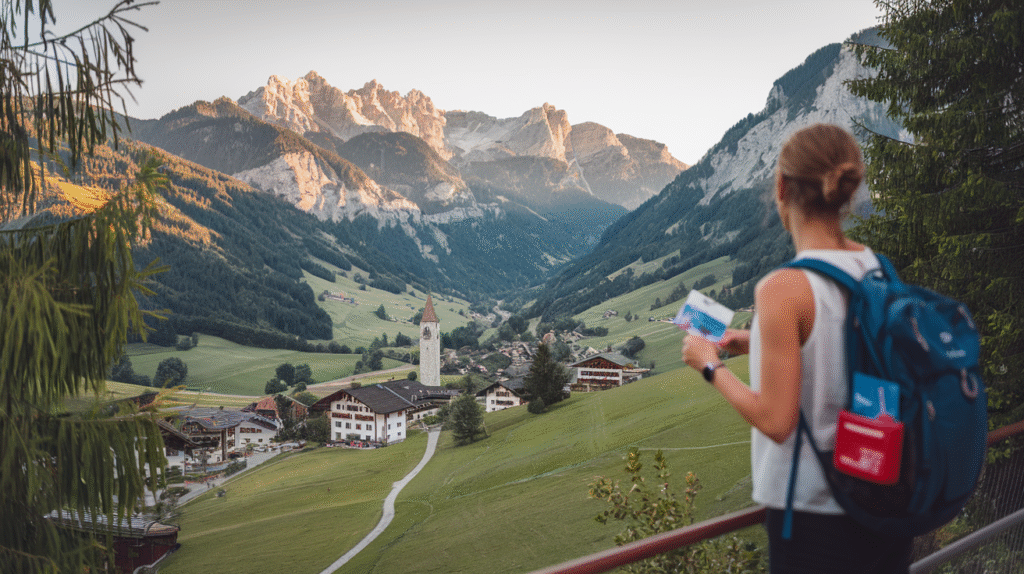
Switzerland may have a reputation as an expensive destination, but with the right strategies, it’s entirely possible to experience its alpine beauty without depleting your savings. By mastering Switzerland’s public transportation system through Supersaver tickets, Saver Day Passes, and regional guest cards, you can explore the country efficiently while keeping costs manageable. Combining budget-friendly accommodations like youth hostels, Reka Villages, and camping sites with smart dining choices such as supermarket shopping, picnicking, and using apps like “Too Good To Go” dramatically reduces daily expenses.
The true magic of Switzerland lies in its abundance of free natural attractions. From hiking the breathtaking Swiss Alps to enjoying free museum days and city tours, some of the most memorable Swiss experiences cost nothing at all. Plan your visit during shoulder seasons (April-June and September-November), embrace the local customs of drinking pristine tap water from public fountains, and consider cooking simple meals to stretch your budget further. With careful planning and these insider tips, you can experience the stunning landscapes, charming villages, and cultural richness of Switzerland while spending as little as 95-200 CHF per day. Your budget-friendly Swiss adventure awaits proving that this Alpine paradise is accessible to travelers of all budgets.
